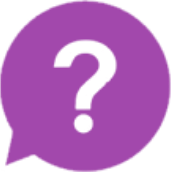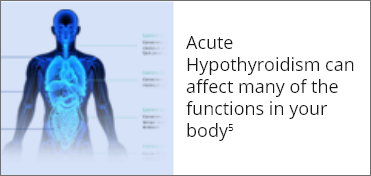Thyroid Hormone Withdrawal Occurs When Your Doctor
Temporarily Stops Your Thyroid Hormone Medication1
In the treatment and follow up of thyroid cancer, for certain procedures, you need a high level of thyroid stimulating hormone (TSH). A high level of TSH facilitates thyroid cancer treatment and detection of remaining, recurring, or metastatic thyroid cancer.
To obtain a high level of TSH, your doctor may choose to temporarily stop your thyroid hormone medication four to six weeks before treatment with radioactive iodine (RAI), or for diagnostic testing. This process is called thyroid hormone withdrawal (THW).
Normal levels of TSH are between 0.4 to 4 mlU/L. However, when preparing for treatment with radioactive iodine ablation or for diagnostic testing, the TSH needs to be at least as high as 30 mlU/L.2
TSH Levels After Thyroid
Hormone Withdrawal (THW)3
It takes 4-6 weeks of stopping thyroid hormone medication for the TSH to go up to the levels required for successful radioactive iodine (RAI) ablation and/or diagnostic testing. (whole-body scan (WBS) or stimulated thyroglobulin (Stim Tg) blood test).

The Impact of Thyroid Hormone Withdrawal
When your doctor asks you to stop your thyroid medication, your hormone level will decrease significantly, and this may lead to signs and symptoms of acute hypothyroidism. Weakness, lethargy, cold intolerance, paleness, dry skin, coarse hair, and constipation can occur with acute hypothyroidism. Other symptoms may include delayed reflexes (such as the knee jerk when the knee is hit with a reflex hammer), brittle nails, increased blood pressure, and a slow heart rate.4
Thyroid Hormone Withdrawal (THW) may result in several weeks of acute hypothyroidism6
Levothyroxine (also commonly known by brand names such as Synthroid, Eltroxin or Levoxyl) is typically stopped for at least four and preferably six weeks prior to the radioactive iodine. Patients who have been on very high doses of levothyroxine for long periods of time may need to stop their medication more than 4-6 weeks prior to their treatment in order for the TSH to increase sufficiently.5


Clinical Studies Show Patients Experiencing Acute Hypothyroidism Experience Greater Levels of Anxiety and Depression as well as Lesser Control of Motor Activities7
Patients experience significantly less depression, anxiety and psychomotor retardation while on their thyroid hormone medication.
“Patients experience a wide spectrum of symptoms during their period of temporary hypothyroidism. Thus, as a precaution, patients who are hypothyroid should avoid making important decisions and driving or operating heavy machinery for one to two weeks before and after the scan or treatment.”4

(MADRS) = Montgomery and Asberg Rating Scale
(HAM-A) = Hamilton Anxiety Scale
(WRS) = Widlo¨cher Retardation Scale

"Learn about an alternative to thyroid hormone withdrawal (THW) that may help alleviate the signs and symptoms of acute hypothyroidism." Learn More
Important Safety Information and Indications
Important Safety Information and Indications
IMPORTANT SAFETY INFORMATION
Patients should not use Thyrogen with radioiodine if they have a contraindication to the use of radioiodine. Please consult with your doctor for a list of contraindications for radioiodine.
Thyrogen can cause serious side effects, including:
Thyrogen-Induced Hyperthyroidism:
- There have been reports of events that led to death in patients who have not had surgery to have their thyroid gland removed, and in patients with thyroid cancer cells that have spread to other parts of the body.
- Patients over 65 years old with large amounts of leftover thyroid tissue after surgery, or with a history of heart disease, should discuss with their physicians the risks and benefits of Thyrogen.
- Thyrogen can be administered in the hospital for patients at risk for complications from Thyrogen administration.
Stroke:
- Since Thyrogen was first approved for use, there have been reports of central nervous system problems such as stroke in young women who have a higher chance of having a stroke, and weakness on one side of the body. The relationship between THYROGEN administration and stroke is unknown. Patients should remain hydrated prior to treatment with Thyrogen.
Sudden Rapid Tumor Enlargement:
- Leftover thyroid tissue after surgery and cancer cells that have spread to other parts of the body can quickly grow and become painful after Thyrogen administration. Patients with cancer cells near their windpipe, in their central nervous system, or in their lungs may need treatment with a glucocorticoid (a medication to help prevent an increase in the size of the cancer cells before using Thyrogen.)
Risks Associated with Radioiodine Treatment:
- If THYROGEN is administered with radioiodine (RAI), the serious side effects for RAI apply to this combination regimen. Please consult with your doctor for a list of contraindications for radioiodine.
ADVERSE REACTIONS
In clinical studies, the most common side effects reported were nausea and headache.
USE IN SPECIFIC PATIENT POPULATIONS
Pregnant patients: Notify your healthcare provider immediately in the event of a pregnancy. If THYROGEN is administered with radioiodine, the combination regimen should not be used in pregnant women. Thyrogen should be given to a pregnant woman only if the doctor thinks there is a clear need for it.
Breastfeeding patients: If THYROGEN is administered with radioiodine, the combination regimen should not be used in breastfeeding women. It is not known whether Thyrogen can appear in human milk. Breastfeeding women should discuss the benefits and risks of Thyrogen with their physician.
Children: Safety and effectiveness in young patients (under the age of 18) have not been established.
Elderly: Studies do not show a difference in the safety and effectiveness of Thyrogen between adult patients less than 65 years and those over 65 years of age.
Patients with kidney disease: Thyrogen exits the body much slower in dialysis patients and can lead to longer high TSH levels.
INDICATIONS AND USAGE
Thyrogen (thyrotropin alfa) is used to help identify thyroid disease by testing the blood for a hormone called thyroglobulin in the follow up of patients with a certain type of thyroid cancer known as well differentiated thyroid cancer. It is used with or without a radiology test using a form of iodine.
Limitations of Use:
- The effect of Thyrogen on long term thyroid cancer outcomes has not been determined.
- When Thyrogen is used to help detect thyroid cancer, there is still a chance all or parts of the cancer could be missed.
Thyrogen is also used to help patients prepare for treatment with a form of iodine, called radioiodine, to remove leftover thyroid tissue in patients who have had surgery to take out the entire thyroid gland for patients with well differentiated thyroid cancer who do not have signs of thyroid cancer which has spread to other parts of the body.
Limitations of Use:
- In a study of people being prepared for treatment with a form of iodine after thyroid surgery, results were similar between those who received Thyrogen and those who stopped taking their thyroid hormone for up to 5 years after treatment. Researchers do not know if results would be similar over a longer period of time.
Click here for full Prescribing Information.
References
1) Clinical Thyroidology for the Public; Vol 4 Issue 1 » Vol 4 Issue 1 p.3-4; https://www.thyroid.org/patient-thyroid-information/ct-for-patients/vol-4-issue-1/vol-4-issue-1-p-3-4; Accessed June, 2020.
2) Zekiye Hasbek1,* and Bülent Turgut; Is Very High Thyroid Stimulating Hormone Level Required in Differentiated Thyroid Cancer For Ablation Success? Mol Imaging Radionucl Ther. 2016 Jun; 25(2): 79–84. Published online 2016 Jun 6. doi: 10.4274/mirt.88598; https://www.ncbi.nlm.nih.gov/pmc/articles/PMC5096624; Accessed June, 2020.
3) Rosario et al; Area under the curve of TSH after levothyroxine withdrawal versus administration of recombinant human TSH (rhTSH): possible implications for tumor growth. Arq Bras Endocrinol Metab. 2009;53/6
4) K. Burman;Hypothyroidism Symptoms Following Temporary Withdrawal from Thyroid Hormone; Excerpted, with permission, from pages 92-93 of “Withdrawal of Thyroid Hormones,” Chapter 915 of the reference book “Thyroid Cancer: A Guide for Patients”, Keystone Press, 2010. Douglas Van Nostrand, M.D., Gary Bloom, and Leonard Wartofsky, M.D. See http://www.thyca.org/about/TCGuide/
5) Jason Baker MD; The Effects of Hypothyroidism in the Body; https://www.healthline.com/health/hypothyroidism/effects-of-hypothyroidism#1; Accessed June, 2020
6) RADIOACTIVE IODINE FOR THE TREATMENT OF THYROID CANCER. MyThyroid.com; http://www.mythyroid.com/radioactiveiodinecancer.html. Accessed June, 2020
7) E. L. Constant et al. Cerebral Blood Flow and Glucose Metabolism in Hypothyroidism: A Positron Emission Tomography; The Journal of Clinical Endocrinology & Metabolism, Volume 86, Issue 8, 1 August 2001, Pages 3864–3870, https://doi.org/10.1210/jcem.86.8.7749. Accessed June, 2020
Important Safety Information and Indications
IMPORTANT SAFETY INFORMATION
Patients should not use Thyrogen with radioiodine if they have a contraindication to the use of radioiodine. Please consult with your doctor for a list of contraindications for radioiodine.
Thyrogen can cause serious side effects, including:
Thyrogen-Induced Hyperthyroidism:
- There have been reports of events that led to death in patients who have not had surgery to have their thyroid gland removed, and in patients with thyroid cancer cells that have spread to other parts of the body.
- Patients over 65 years old with large amounts of leftover thyroid tissue after surgery, or with a history of heart disease, should discuss with their physicians the risks and benefits of Thyrogen.
- Thyrogen can be administered in the hospital for patients at risk for complications from Thyrogen administration.
Stroke:
- Since Thyrogen was first approved for use, there have been reports of central nervous system problems such as stroke in young women who have a higher chance of having a stroke, and weakness on one side of the body. The relationship between THYROGEN administration and stroke is unknown. Patients should remain hydrated prior to treatment with Thyrogen.
Sudden Rapid Tumor Enlargement:
- Leftover thyroid tissue after surgery and cancer cells that have spread to other parts of the body can quickly grow and become painful after Thyrogen administration. Patients with cancer cells near their windpipe, in their central nervous system, or in their lungs may need treatment with a glucocorticoid (a medication to help prevent an increase in the size of the cancer cells before using Thyrogen.)
Risks Associated with Radioiodine Treatment:
- If THYROGEN is administered with radioiodine (RAI), the serious side effects for RAI apply to this combination regimen. Please consult with your doctor for a list of contraindications for radioiodine.
ADVERSE REACTIONS
In clinical studies, the most common side effects reported were nausea and headache.
USE IN SPECIFIC PATIENT POPULATIONS
Pregnant patients: Notify your healthcare provider immediately in the event of a pregnancy. If THYROGEN is administered with radioiodine, the combination regimen should not be used in pregnant women. Thyrogen should be given to a pregnant woman only if the doctor thinks there is a clear need for it.
Breastfeeding patients: If THYROGEN is administered with radioiodine, the combination regimen should not be used in breastfeeding women. It is not known whether Thyrogen can appear in human milk. Breastfeeding women should discuss the benefits and risks of Thyrogen with their physician.
Children: Safety and effectiveness in young patients (under the age of 18) have not been established.
Elderly: Studies do not show a difference in the safety and effectiveness of Thyrogen between adult patients less than 65 years and those over 65 years of age.
Patients with kidney disease: Thyrogen exits the body much slower in dialysis patients and can lead to longer high TSH levels.
INDICATIONS AND USAGE
Thyrogen (thyrotropin alfa) is used to help identify thyroid disease by testing the blood for a hormone called thyroglobulin in the follow up of patients with a certain type of thyroid cancer known as well differentiated thyroid cancer. It is used with or without a radiology test using a form of iodine.
Limitations of Use:
- The effect of Thyrogen on long term thyroid cancer outcomes has not been determined.
- When Thyrogen is used to help detect thyroid cancer, there is still a chance all or parts of the cancer could be missed.
Thyrogen is also used to help patients prepare for treatment with a form of iodine, called radioiodine, to remove leftover thyroid tissue in patients who have had surgery to take out the entire thyroid gland for patients with well differentiated thyroid cancer who do not have signs of thyroid cancer which has spread to other parts of the body.
Limitations of Use:
- In a study of people being prepared for treatment with a form of iodine after thyroid surgery, results were similar between those who received Thyrogen and those who stopped taking their thyroid hormone for up to 5 years after treatment. Researchers do not know if results would be similar over a longer period of time.
Click here for full Prescribing Information.
References
1) Clinical Thyroidology for the Public; Vol 4 Issue 1 » Vol 4 Issue 1 p.3-4; https://www.thyroid.org/patient-thyroid-information/ct-for-patients/vol-4-issue-1/vol-4-issue-1-p-3-4; Accessed June, 2020.
2) Zekiye Hasbek1,* and Bülent Turgut; Is Very High Thyroid Stimulating Hormone Level Required in Differentiated Thyroid Cancer For Ablation Success? Mol Imaging Radionucl Ther. 2016 Jun; 25(2): 79–84. Published online 2016 Jun 6. doi: 10.4274/mirt.88598; https://www.ncbi.nlm.nih.gov/pmc/articles/PMC5096624; Accessed June, 2020.
3) Rosario et al; Area under the curve of TSH after levothyroxine withdrawal versus administration of recombinant human TSH (rhTSH): possible implications for tumor growth. Arq Bras Endocrinol Metab. 2009;53/6
4) K. Burman;Hypothyroidism Symptoms Following Temporary Withdrawal from Thyroid Hormone; Excerpted, with permission, from pages 92-93 of “Withdrawal of Thyroid Hormones,” Chapter 915 of the reference book “Thyroid Cancer: A Guide for Patients”, Keystone Press, 2010. Douglas Van Nostrand, M.D., Gary Bloom, and Leonard Wartofsky, M.D. See http://www.thyca.org/about/TCGuide/
5) Jason Baker MD; The Effects of Hypothyroidism in the Body; https://www.healthline.com/health/hypothyroidism/effects-of-hypothyroidism#1; Accessed June, 2020
6) RADIOACTIVE IODINE FOR THE TREATMENT OF THYROID CANCER. MyThyroid.com; http://www.mythyroid.com/radioactiveiodinecancer.html. Accessed June, 2020
7) E. L. Constant et al. Cerebral Blood Flow and Glucose Metabolism in Hypothyroidism: A Positron Emission Tomography; The Journal of Clinical Endocrinology & Metabolism, Volume 86, Issue 8, 1 August 2001, Pages 3864–3870, https://doi.org/10.1210/jcem.86.8.7749. Accessed June, 2020

.png)


